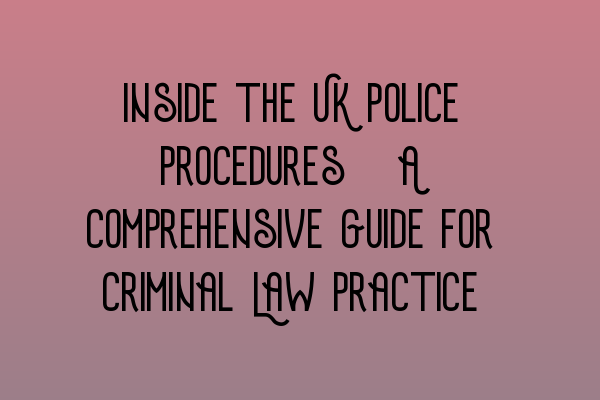Inside the UK Police Procedures: A Comprehensive Guide for Criminal Law Practice
Are you a criminal law practitioner or aspiring to become one? Understanding the intricacies of the UK police procedures is key to effectively representing your clients. In this comprehensive guide, we will take you through a step-by-step journey into the world of UK police procedures, providing you with valuable insights and essential knowledge that will enhance your criminal law practice.
1. Introduction to UK Police Procedures
Before delving into the nitty-gritty details, let’s start with a brief overview of the UK police procedures. The criminal justice system in the UK operates within a framework that ensures the fair investigation and prosecution of criminal offenses. It is vital for criminal law practitioners to have a solid understanding of the inner workings of the police force to navigate their way through the system effectively.
2. Arrest and Detention
The very first step in the criminal justice process is the arrest of a suspect. We will guide you through the lawful grounds for arrest, the process of detention, and the rights of the suspect during this crucial stage. Understanding the legal requirements and procedures surrounding arrest and detention is essential for safeguarding the rights of your clients.
3. Search and Seizure
During the investigation process, the police may carry out searches and seize evidence that could be crucial to a case. We will provide you with a comprehensive breakdown of the rules governing search and seizure, including the necessity for search warrants, the scope of search powers, and the admissibility of seized evidence in court.
4. Police Interviews
Police interviews play a pivotal role in criminal investigations. As a criminal law practitioner, it is imperative to understand the techniques employed during police interviews and how they can impact the outcome of a case. We will explore the various interview techniques used by the police, the legal rights of the suspect during questioning, and strategies for effectively representing your clients during interviews.
5. Bail and Remand
Once a suspect is in custody, decisions regarding bail and remand become crucial. Our guide will walk you through the factors considered by the court when deciding whether to grant bail or remand a suspect, the rights of the accused during the bail process, and strategies for presenting successful bail applications.
6. Disclosure
Disclosure of evidence is a fundamental aspect of the criminal justice process. We will delve into the obligations of the police to disclose evidence to the defense, the principles governing disclosure, and the steps you can take to ensure your clients receive all relevant material necessary for a fair trial.
7. Identification Procedures
Identification procedures can often make or break a case. We will provide an in-depth exploration of the different identification procedures employed by the police, including lineups, photo identification, and identification parades. Understanding the potential flaws and challenges associated with identification evidence will enable you to build a solid defense for your clients.
8. Caution and Admissions
Understanding the implications of a caution and admissions made during interviews is crucial for effective criminal law practice. We will guide you through the requirements for a valid caution, the admissibility of admissions, and strategies for challenging the reliability and voluntariness of statements made by suspects.
9. Charging and Bail Hearings
Once the investigation is complete, the decision to charge a suspect is made. We will provide an overview of the charging process, from the initial appearance before the Magistrates’ Court to potential bail hearings. Understanding the procedures and factors considered by the court will enable you to navigate the process with confidence.
10. Conclusion
As a criminal law practitioner, staying at the forefront of the UK police procedures is essential for providing effective representation to your clients. This comprehensive guide serves as a handy reference, equipping you with the knowledge and insights necessary to navigate the complexities of the criminal justice system. By understanding the procedures involved, you can develop solid defense strategies and ultimately achieve the best possible outcomes for your clients.
At SQE Criminal Law & Practice Law UK, we are dedicated to providing the highest quality legal guidance and resources to criminal law practitioners. For further assistance or to inquire about our services, please do not hesitate to contact us.
